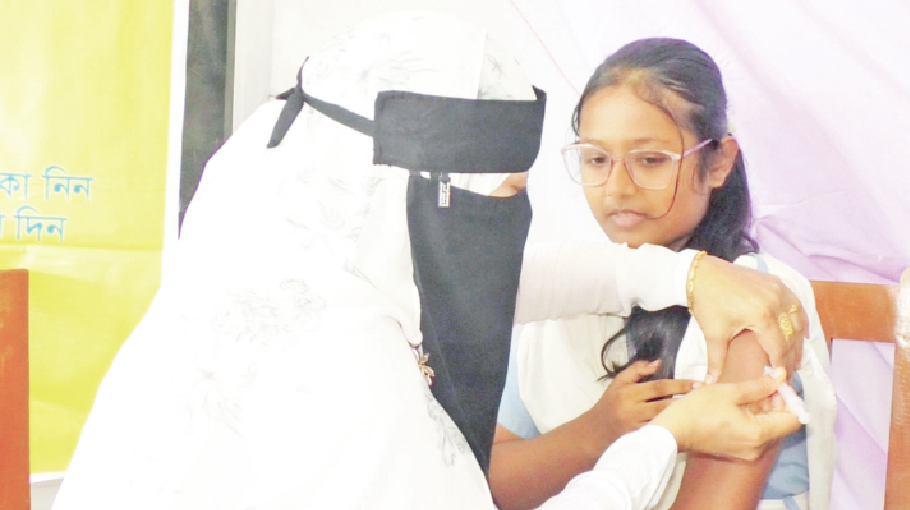Final phase of HPV vaccination campaign launched to protect over 6.2 mn girls

The interim government of Bangladesh on Thursday launched the final phase of Human Papillomavirus (HPV) vaccination campaign in Barishal, Chattogram, Khulna, Mymensingh, Rajshahi, Sylhet and Rangpur divisions, with the support of Gavi, the Vaccine Alliance (Gavi), UNICEF and WHO to protect 6.2 million girls aged 10-14 against cervical cancer.
This final phase campaign will span for a month building on the success of the first phase of protecting more than 1.5 million girls with the HPV vaccine in October 2023 in the Dhaka division.
After the campaign concludes next month, the HPV vaccine will be integrated into the routine immunization program for girls in grade V and 10-year-old girls who are out of the education system.
“Second highest cancer related deaths among women are caused due to cervical cancer in Bangladesh. The government successfully vaccinated more than 1.5 million girls with a single dose of the HPV vaccine in the Dhaka division in October 2023,” said MA Akmall Hossain Azad, Senior Secretary, Health Service Division, Ministry of Health and Family Welfare.
He said, HPV vaccines will be provided free of cost in the remaining seven divisions to vaccinate girls studying in class five to nine and girls aged 10-14 years who are out of education institutions.
“A single dose of HPV vaccine will prevent cervical cancer, protect women’s health and help to build a healthy nation.”
With Gavi´s support, 6.2 million vaccines have been procured in 2024 and will be available at educational institutions or designated vaccination centers free of cost after registering on the “VaxEPI” app or on the dedicated website.
Vaccination sessions will be held regularly from 8am to 3:30pm, except on weekends and public holidays.
“Today’s launch means millions more girls will be protected against cervical cancer in the years to come,” said Thabani Maphosa, Chief Country Delivery Officer at Gavi, the Vaccine Alliance.
“Gavi, in partnership with the government of Bangladesh, is committed to expanding access to this life-saving vaccine, ensuring that women and girls across the country have the opportunity to thrive and lead healthy lives.”
In 2023, over 14 million girls across the world -including the 1.5 million girls in Bangladesh – were vaccinated against HPV with Gavi support.
This critical second vaccination phase will build on last year’s incredible progress and contribute towards the Alliance’s goal of reaching 86 million girls by the end of 2025.“We congratulate the Ministry of Health and Family Welfare and the EPI Program of the Directorate General of Health Services for completing the first phase of the groundbreaking HPV campaign in the Dhaka Division,” said Emma Brigham, UNICEF Representative OIC to Bangladesh.
“Now it is time to get these life-saving vaccines to the girls in the remaining seven divisions of Bangladesh specially focusing on out-of-school girls, girls studying in informal and religious schools, and girls living on the streets so that no one is left behind,” said Emma Brigham said.
UNICEF commits to work closely with the interim government of Bangladesh on the overall planning and execution of the HPV campaign, the supply of HPV vaccines, cold chain maintenance, the maintenance of the Vax EPI app, and the crucial social and behavioral change communication and public outreach to make sure that every girl is protected against cervical cancer.
Cervical cancer claims the lives of about five thousand women every year in Bangladesh. However, it can be prevented through vaccination, one of the most cost-effective medical interventions; studies have shown an almost 90 per cent reduction in cervical cancer among girls who received HPV vaccine.
“Vaccines Save Lives. The HPV vaccination campaign led by the Ministry of Health and Family Welfare is a life-saving measure that can significantly reduce the risk of cervical cancer and protect future generations,” Dr Bardan Jung Rana, WHO Representative to Bangladesh.
By uniting in this effort, he said, they have the power to safeguard the women of Bangladesh and pave the way for a healthier future.
There is a commitment to ensure that every girl between the ages of 10 and 14 receives her HPV vaccine during the nationwide campaign in October and November 2024.
“Together, we are championing the health and well-being of the nation’s daughters.” said Rana said.
WHO is working closely with the Government of Bangladesh on the overall planning, implementation and monitoring of the HPV campaign including microplanning, training, advocacy, real time supervision & monitoring, and vaccine safety surveillance to make sure that every target girl receive one dose of HPV vaccine.




